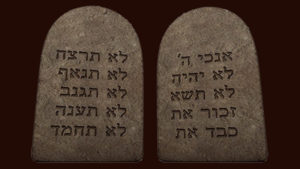 God spoke what we call the “Ten Commandments” in the hearing of all of Israel. The people were terrified and requested that Moses hear from God on their behalf. So God gave the more detailed commandments to Moses who then relayed them to Israel. According to Rabbinical reckoning, there are 613 commandments. These commandments define what I will call a “Biblical lifestyle” for God’s people.
God spoke what we call the “Ten Commandments” in the hearing of all of Israel. The people were terrified and requested that Moses hear from God on their behalf. So God gave the more detailed commandments to Moses who then relayed them to Israel. According to Rabbinical reckoning, there are 613 commandments. These commandments define what I will call a “Biblical lifestyle” for God’s people.
When we consider the commandments, I propose that they fall into two basic categories: the first has to do with commandments defining relationship between God and man, the second category has to do with commandments defining relationship between man and his neighbor. In other words, the first has to do with vertical relationships while the second has to do with horizontal relationships. In a similar manner, we can consider the first five of the “Ten Commandments” are vertical while the last five are horizontal. Jesus recognized these two categories. When asked concerning the most important commandment, He answered:
“The foremost is, “HEAR O ISRAEL! THE LORD OUR GOD IS ONE LORD; AND YOU SHALL LOVE THE LORD YOUR GOD WITH ALL YOUR HEART, AND WITH ALL YOUR SOUL, AND WITH ALL YOUR MIND AND WITH ALL YOUR STRENGTH.” “The second is this, “YOU SHALL LOVE YOUR NEIGHBOR AS YOURSELF.” There is no other commandment greater than these. (Mark 12:29-31)
It is obvious that Jesus divided the Law into vertical and horizontal components. I won’t go into detail here but only give reference the Torah II study at the Tzemach Institute for a detailed listing of the commandments and their relationship to the “Ten Commandments”.
Many Christians today have been taught that these commandments are not applicable to the Church. Their teachers maintain that Israel received the “Law” and the Church received “Grace”. The truth is that God has always set forth Law which is always moderated by Grace. There is never Law without Grace and there is never Grace without Law. In reality, the Church’s position on this subject allows itself to pick and choose which of the commandments are to be observed and which are to be ignored. For example, the pattern of tithing set forth in the Torah is maintained while Biblical festivals have been replaced by alternate ones. Certainly there are commandments that pertain to Israel in the Land and specifically to the priesthood in the Temple. Even these commandments reveal spiritual patterns that are relevant for the Christian believer.
Let me quickly add that neither Israel nor the Church was ever justified by their observance of the Law. Justification for Israel is by Grace as it is for Christians. When an Israeli sinned and repented, there was a revealed pattern in the Torah for atonement for the sin. He was forgiven in order to resume a fruitful life of obedience. The same is true for the Christian.
Christian leaders by the second century began to reject the Law in order to establish an identity separate from Israel. Eventually a catholic (universal, non-national) identity was embraced which was distinct from Israel. This is almost universally accepted in Christianity today. This was never God’s plan. The Church was designed to be an anointed subgroup of Israel with a specific purpose both within Israel and in the world but with a common identity with Israel. Paul warned the early Church that if they became arrogant and envisioned themselves separate from Israel that God would cut them off. (Romans 11:17-24)
We are living in the days of the fulfillment of more Biblical prophecy than any preceding generation. Are you, as a Christian, stubbornly holding onto a distinct catholic identity? Jesus is calling a people today who will see what He is doing in the midst of His people Israel and join Him in that work. John Kennedy once declared in Germany “Ich bin ein Berliner” in an effort to identify with the citizens there. Today, I declare that “I am an Israeli” not by birth, not even by religion but by following my Lord, even Messiah Jesus. This is one “cross” that Jesus is asking you to bear today.
A very important revelation is included in this section of the Bible. Moses and the elders of Israel saw a manifestation of God and recorded what I will call “the God of Israel on His throne” although the throne is not specifically mentioned here.
“Then Moses went up with Aaron, Nadab and Abihu, and seventy of the elders of Israel, and they saw the God of Israel; and under His feet there appeared to be a pavement of sapphire, as clear as the sky itself. Yet He did not stretch out His hand against the nobles of the sons of Israel; and they saw God, and they ate and drank.” (Exodus 24:9-11)
This Scripture should be compared to the revelations recorded in Isaiah 6, Ezekiel 1, and Revelation 4 and 5. These Scriptures record the very rare visions of God on His throne. Whenever we approach God in worship, these visions alone provide the basis for us to envision the setting for our worship experience.